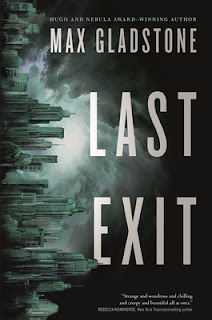I'm going to open with, this is an excellent K.J. parker book. If you're already a fan, then you'll know what you're getting here. Cynicism, witty banter, a lot of wry humour, and politics, scheming, and people whose motives are less than clear. It's maybe a little less dark than some of their other work, but still not afraid to explore the truth of what people are actually like, behind the stories that they write for themselves.
Actually, that's one of the central themes here. The protagonist is trying to make the best of the situation from the preceding two books in the series - the destruction of the Empire he called home. At least until it was burnt ot the ground. Now he's living on charity and trying to work out where ot go from here. Saving his skin leads to consequneces that escalate his visibility, which leads to more actions, well, in line with the story title.
Felix, the protagonist, is wonderfully drawn, and fits the mode of other Parker leads. He's introverted, intelligent, has a deep affection for books and knowledge, and mostly wants to be left alone. His narrative is self deprecating, sharp edged and unforgiving, but it also cloaks a lot of his motivations. Why Felix does what he does is a bit of a mystery, not just to the reader, but to himself. There are always reasons privuded, both to him and us, and the joy is that they're always sensible, plausible reasons. But it often turns out that they were also bullshit. Or they were true, but in service to a different goal. Parker is a star turn at creaitng characters with multi-layered motivaitons, and that's not changed here.
The story is one I don't want to go into great depth on, because its evolution is par tof what make sit so conmpelling. But the progression from lowly translator sleeping on the floor, to someone conquering the world, and afterwards, is artfully paced, and the world is one which is filled with detail and vividly realised. There's a lot of politics and talking, and a lot of careful planning of battles, and seeing how that actually goes - and the epxloration of expectaiton and reality in military matters is compelling enough to keep you turning pages, and it certainly serves to build tension.
In the end, this is, well, it's K.J. Parker. This is an author interested in history, in the lies we tell the world and outselves. In digging into things which are true and hidden, and working out if there actually is a nugget of truth under all the nonsense. Or if we are driven to do what we do by the winds of circumstance and historicla chance. There's whip-smart characterisation, a story whose pacing is set up perfectly to ratchet tension and keep you turning pages, and some rock solid worldbuilding. It's a story that's an absolute pleasure to read, and one I'd recommend to existing fans; it does also work as a standalone for neophytes, but the extra textural details you get from the preceding books are great fun, so maybe read this last.
Anyway, overall, a highly entertaining read, and one I do not hesitate to recommend.





